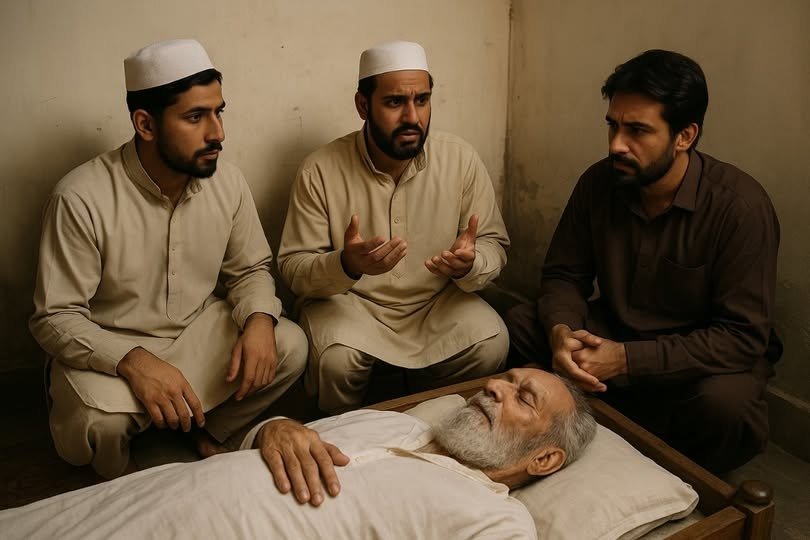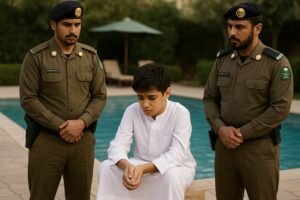Long ago, there lived a man who had three sons. Interestingly, he gave all three of them the same name: Abdullah. Years passed, and eventually, the father fell seriously ill. As his final moments approached, he called his sons to his bedside and gave them a puzzling will. He said:
“Abdullah shall inherit my wealth, Abdullah shall not inherit my wealth, and Abdullah shall inherit my wealth.”
With those words, the man passed away, leaving his three sons in complete confusion. Each one wondered: Which Abdullah was entitled to the inheritance, and which one was not? Unable to solve the matter among themselves, the brothers decided to travel to the city and present their case before a wise judge.

The Lost Camel
On their way to the city, the brothers encountered a man who looked troubled. He was searching desperately for something. The brothers asked what he was looking for, and he replied, “My camel has gone missing, and I am trying to find it.”
The first Abdullah asked him, “Was your camel blind in one eye?”
Surprised, the man replied, “Yes, that’s true!”
The second Abdullah asked, “Was your camel lame in one leg?”
The man, now more shocked, said, “Yes, exactly right!”
The third Abdullah asked, “Was your camel’s tail missing?”
The man clapped his hands in amazement, “Yes! That is correct. Now quickly tell me where my camel is.”
The three brothers calmly replied, “By God, we have never seen your camel, nor do we know where it is.”
But the man did not believe them. Furious, he assumed they must have slaughtered the camel and eaten it. He decided to drag them to the judge, convinced they were guilty. The brothers accepted calmly, saying, “We have no objection, for we were heading to the judge ourselves to solve our own family matter.”
Before the Judge
When they reached the judge, the camel’s owner presented his complaint. The judge listened carefully and then turned to the brothers.
He said, “The way you three described the camel’s exact features makes it obvious that you must have seen it. Better confess now.”
But the brothers explained one by one how they deduced the camel’s condition without ever seeing it.
-
The first Abdullah explained: “On the roadside, the grass was eaten only on one side, while the other side remained untouched. This showed me that the camel must have been blind in one eye.”
-
The second Abdullah said: “I noticed that three of the animal’s footprints were deep, but the fourth was faint. From this I understood that the camel was lame in one leg.”
-
The third Abdullah explained: “Usually, camels spread their droppings on both sides with their tails. But here, the droppings were in a straight line. From this, I realized the camel must have had no tail.”
Hearing their reasoning, the judge turned to the camel’s owner and said:
“These men are innocent. They never saw your camel; they only observed its traces and deduced its condition. You may leave.”
The Test of Wisdom
After the camel owner left, the three brothers presented their inheritance case to the judge. The judge was intrigued and told them, “Stay tonight in the guest house. Tomorrow I will give you an answer.”
That evening, they were given food: bread and a meat dish. The brothers examined the meal.
-
The first Abdullah said, “This meat is not from a lawful animal, it must be dog meat.”
-
The second Abdullah said, “The woman who baked these breads is pregnant and close to giving birth.”
-
The third Abdullah said, “This judge is not from a pure lineage.”
These words reached the judge, and the next morning, he called them to his court.
The First Brother’s Insight
The judge asked, “Who among you said the meat was not lawful?”
The first Abdullah stepped forward and explained:
“I observed the meat. Normally, meat from cows, goats, or camels has proper fat distributed around it. This meat had only layers of fat with little flesh. From this, I realized it was not the meat of a lawful animal.”
The judge investigated and discovered that indeed the cook, out of mischief, had served them meat from a dog. Astonished at the young man’s wisdom, the judge declared:
“You are the Abdullah who deserves inheritance from your father’s wealth.”
The Second Brother’s Wisdom
The judge then asked, “Who said the breads were baked by a woman who is pregnant and close to delivery?”
The second Abdullah replied, “I did. I noticed the breads were uneven. One side was well-cooked and puffed, while the other side was raw and heavy. This suggested the woman was unable to bend properly while baking due to her condition.”
Upon inquiry, it was confirmed that indeed the woman who baked the bread was heavily pregnant. The judge, impressed, said:
“You are also the Abdullah who will receive inheritance from your father.”
The Third Brother’s Perception
Finally, the judge asked, “Who claimed that I am not of pure lineage?”
The third Abdullah admitted, “I did. Because if you were truly born of a good lineage, you would not have spied on us in the guest house, nor allowed us to be served unlawful meat, nor forced a weary woman to bake for us. Such actions are not befitting of a man of noble birth.”
The judge fell silent. He returned to his mother and asked her privately. With tears, she admitted that he was indeed not born from a lawful marriage.
The judge returned and declared:
“You are the Abdullah who will not receive any share of inheritance, for only one of such birth can recognize another.”
The Hidden Truth
Later, the two Abdullahs who were granted inheritance went back to their mother and asked, “What about our third brother? Who is he truly?”
Their mother revealed:
“Years ago, your father once went to the mosque for morning prayer. There, he found an abandoned infant at the door. He brought the child home, named him Abdullah like you both, and raised him as his own.”
Moral of the Story
This story reflects the wisdom-filled tales of the Arabs. It teaches us the power of observation, the importance of truth, and how destiny unfolds in mysterious ways. Real wisdom lies not in wealth or inheritance but in perception, honesty, and the lessons we take from life’s trials.







